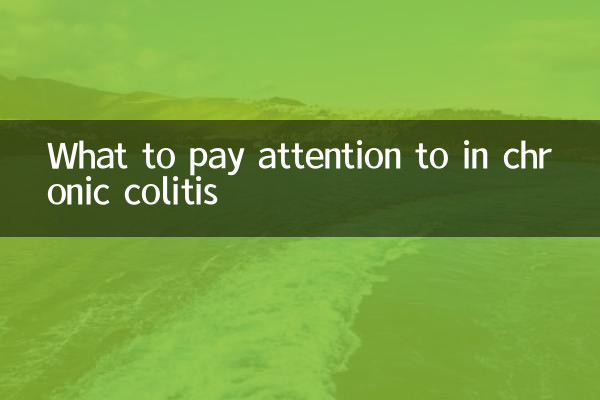What to pay attention to in chronic colitis
Chronic colitis is a common digestive system disease, which mainly manifests symptoms such as abdominal pain, diarrhea, and mucus stool. In severe cases, it may affect the quality of life. In order to help patients better manage their condition, this article combines the hot health topics and hot content on the Internet in the past 10 days to sort out the precautions for chronic colitis and provide structured data for reference.
1. Dietary precautions

Diet is the most important aspect for patients with chronic colitis. A proper diet can reduce symptoms and prevent worsening of the condition. The following are dietary principles to pay attention to:
| food category | Recommended food | avoid food |
|---|---|---|
| staple food | Rice, noodles, steamed buns, oats | Fried food, spicy food, whole grains |
| protein | Eggs, fish, chicken, tofu | Fatty meat, processed meat products (such as sausages, bacon) |
| vegetable | Carrots, pumpkin, spinach (cooked) | Onions, garlic, peppers, lettuce |
| fruit | Banana, apple (peeled), pear | Citrus, watermelon, pineapple |
| drinks | Warm water, light tea, rice soup | Coffee, alcohol, carbonated drinks |
2. Adjustment of living habits
In addition to diet, lifestyle habits are also crucial to the management of chronic colitis. Here are some suggestions:
1.Regular schedule:Ensure adequate sleep, avoid staying up late and reduce physical fatigue.
2.Moderate exercise:Choose gentle exercise, such as walking and yoga, to avoid strenuous exercise that aggravates the intestinal burden.
3.Emotional management:Excessive stress will aggravate symptoms. It is recommended to relieve anxiety through meditation, deep breathing and other methods.
4.Quit smoking and drinking:Tobacco and alcohol can irritate the intestinal mucosa and aggravate the inflammatory response.
3. Drug treatment and regular examinations
Patients with chronic colitis usually need long-term medication to control symptoms. The following are some common treatment medications and precautions:
| drug type | effect | Things to note |
|---|---|---|
| anti-inflammatory drugs | Reduce intestinal inflammation | Follow medical advice to avoid long-term abuse |
| Probiotics | Regulate intestinal flora | Choose appropriate bacterial strains and avoid taking them with antibiotics |
| antidiarrheal medicine | Relieve diarrhea symptoms | Use with caution in the acute stage to avoid covering up the condition |
| nutritional supplements | Improve malnutrition | Supplement vitamins and minerals as recommended by your doctor |
In addition, patients should undergo regular colonoscopy to monitor changes in their condition and detect possible complications in a timely manner.
4. Prevention of complications
If chronic colitis is not controlled, it may lead to more serious health problems, such as intestinal perforation and intestinal obstruction. Here are key steps to prevent complications:
1.Seek medical attention promptly:If symptoms suddenly worsen (such as severe abdominal pain, bloody stools), you should seek medical attention immediately.
2.Avoid drug abuse:Antibiotics and nonsteroidal anti-inflammatory drugs, in particular, may worsen intestinal damage.
3.Nutritionally balanced:Long-term diarrhea may lead to malnutrition, so attention should be paid to supplementing protein and trace elements.
5. Summary
The management of chronic colitis requires cooperation from many aspects, including reasonable diet, adjustment of living habits, standardized medication and regular examinations. Through scientific self-management, patients can effectively control symptoms and improve quality of life. If the condition recurs or worsens, be sure to consult a professional doctor promptly to develop a personalized treatment plan.
We hope that the content of this article can help patients with chronic colitis better understand the disease and take correct measures to maintain their health.

check the details

check the details